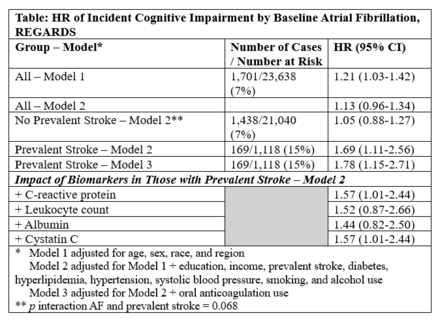Final ID: P2094
Atrial Fibrillation and Risk of Incident Cognitive Impairment: The Reasons for Geographic and Racial Differences in Stroke (REGARDS) Study
Abstract Body: Introduction: Atrial fibrillation (AF) and cognitive impairment are expected to double in prevalence over the next 20 years. While most literature on AF and risk of cognitive disorders is focused on dementia, there is little evidence on cognitive impairment or non-stroke populations. We addressed this question in the REGARDS cohort.
Hypothesis: Baseline AF is associated with increased risk of incident cognitive impairment (ICI) in REGARDS participants with and without prevalent stroke. We tested for differences in this association by prevalent stroke, race (Black and White), and oral anticoagulant use, and for the attenuating effect of selected biomarkers on associations.
Methods: REGARDS enrolled 30,239 persons >45 years old in 2003-07. AF was defined by self-report or ECG. ICI was defined during follow-up by robust cognitive norms based on the Montreal Cognitive Assessment and Six-Item Screener. HRs of time to ICI with AF were calculated by Cox proportional hazards models (Table footnote), with censoring at death or last follow-up. Considered individually, interaction terms for prevalent stroke, race, and oral anticoagulant use with AF were assessed.
Results: Among 23,638 participants with mean follow-up 12.8 years (mean age 64.3 years, 56.3% women, 37.6% Black), the association of AF with ICI was modest (HR 1.21; see Table). The adjusted HR was greater in those with prevalent stroke than without stroke (1.69 vs. 1.05). Among those with prevalent stroke, there was little impact of added adjustment for anticoagulant use; with added adjustment for each biomarker individually, there was small-modest attenuation by each biomarker. HRs did not differ by race or oral anticoagulant use (both p interactions >0.4).
Conclusion: Independent of other factors including anticoagulant use, AF was associated with ICI in those with prevalent stroke, but not in those without prevalent stroke. Biomarkers had modest attenuating effects on the association among those with prevalent stroke. Results underscore the importance of considering cognitive impairment after stroke in those with AF and identifying underlying causes, which could involve inflammation.
Hypothesis: Baseline AF is associated with increased risk of incident cognitive impairment (ICI) in REGARDS participants with and without prevalent stroke. We tested for differences in this association by prevalent stroke, race (Black and White), and oral anticoagulant use, and for the attenuating effect of selected biomarkers on associations.
Methods: REGARDS enrolled 30,239 persons >45 years old in 2003-07. AF was defined by self-report or ECG. ICI was defined during follow-up by robust cognitive norms based on the Montreal Cognitive Assessment and Six-Item Screener. HRs of time to ICI with AF were calculated by Cox proportional hazards models (Table footnote), with censoring at death or last follow-up. Considered individually, interaction terms for prevalent stroke, race, and oral anticoagulant use with AF were assessed.
Results: Among 23,638 participants with mean follow-up 12.8 years (mean age 64.3 years, 56.3% women, 37.6% Black), the association of AF with ICI was modest (HR 1.21; see Table). The adjusted HR was greater in those with prevalent stroke than without stroke (1.69 vs. 1.05). Among those with prevalent stroke, there was little impact of added adjustment for anticoagulant use; with added adjustment for each biomarker individually, there was small-modest attenuation by each biomarker. HRs did not differ by race or oral anticoagulant use (both p interactions >0.4).
Conclusion: Independent of other factors including anticoagulant use, AF was associated with ICI in those with prevalent stroke, but not in those without prevalent stroke. Biomarkers had modest attenuating effects on the association among those with prevalent stroke. Results underscore the importance of considering cognitive impairment after stroke in those with AF and identifying underlying causes, which could involve inflammation.
More abstracts on this topic:
Admission Cell-free DNA Predicts Cardiogenic Shock Progression and In-Hospital Mortality
Park Ashley, Kong Hyesik, Andargie Temesgen, Jang Moon, Solomon Michael, Brusca Samuel, Barnett Christopher, Obrien Connor, Agbor-enoh Sean
A novel risk score predicts the prevalence of left atrial low-voltage areas and rhythm outcome in patients undergoing long-standing persistent atrial fibrillation ablationOoka Hirotaka, Nakao Sho, Kusuda Masaya, Ariyasu Wataru, Kudo Satoshi, Fujii Subaru, Mano Toshiaki, Matsuda Yasuhiro, Masuda Masaharu, Okamoto Shin, Ishihara Takayuki, Nanto Kiyonori, Tsujimura Takuya, Hata Yosuke, Uematsu Hiroyuki

